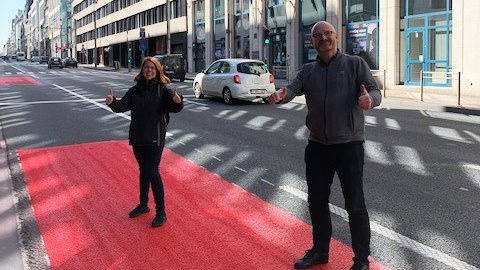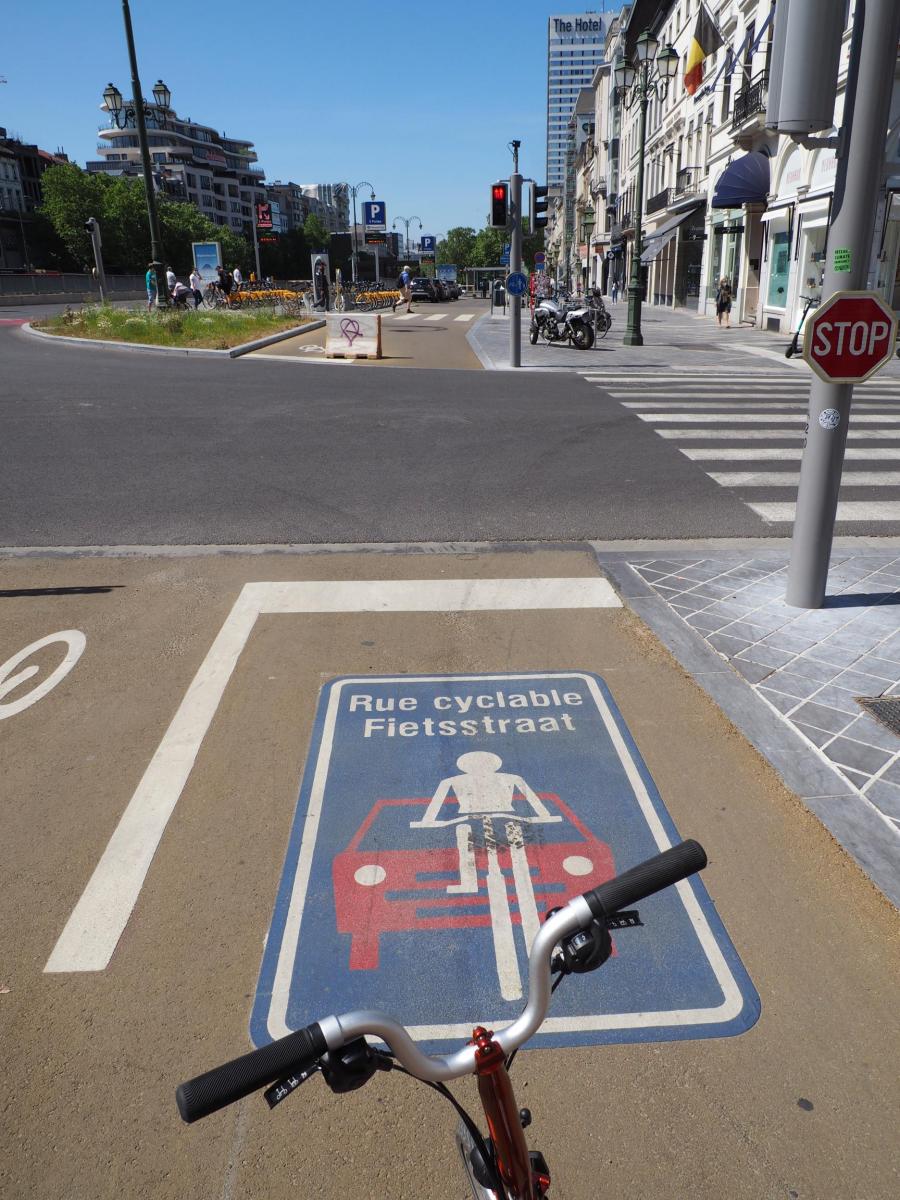
Move Aside Cars! Pop-up Cycle Lanes for a Post-Lockdown World
Author: Maya Watson
From Brussels to Budapest, cities are instituting measures to help active travelers keep their social distance while staying safe from cars. In this new mini-series we look at how cities around the world are reclaiming the streets to keep essential workers and residents healthy and safe. Part 3 takes a quick look at the new temporary cycling lanes popping up around Europe.
As deconfinement measures begin, European cities fear residents will turn to private cars instead of public transit for their commute. Indeed, public transportation levels are predicted to drop to 40% of pre-lockdown levels in London. In Berlin, where lockdown restrictions are beginning to lift, driving levels have returned to 28% below pre-quarantine, but public transit ridership still remains 61% below the norm. To prevent the turn to private cars, cities have been urgently developing temporary cycling lanes.
Temporary Cycling Lanes
 Since the start of April, Budapest has been building temporary bicycle lanes at the edges of multi-lane roads in both directions. These lanes will allow residents to maintain social distance, keeping safe while travelling. The Municipality of Budapest has also said that, should these lanes prove successful, some temporary paths may become permanent after the pandemic.
Since the start of April, Budapest has been building temporary bicycle lanes at the edges of multi-lane roads in both directions. These lanes will allow residents to maintain social distance, keeping safe while travelling. The Municipality of Budapest has also said that, should these lanes prove successful, some temporary paths may become permanent after the pandemic.
From Dijon, to Le Mans, to Paris 116 cities in France have committed to building cycling lanes. Indeed, Paris’ and Ile de France will build 650 km of cycleways. On a national level, France released a 20 million euro plan to support cyclists. Measures include a 50 euro subsidy/person for bicycle repair. Co-financing for territories lacking sufficient funds is also available.
In Berlin, two cycling lanes were widened in early quarantine, responding to the drop in car-traffic in the Kreuzberg district. On April 10, local authorities have declared these lanes a successful option to maintain a safe social distance for cyclists. More temporary cycling lanes will soon join these first trail lanes in Kreuzberg, Schöneberg, and Tempelhof. In 133 other German cities, residents have also demanded their local authorities for temporary bike lanes.
 Milan’s Strade Aperte plan for a post-Covid-19 city includes 35 km of new temporary cycle lanes, along with speed limits, wider pavements, and active mobility priority streets. On the future of cars in Milan, the Guardian reported the deputy mayor, Marco Granelli, said:
Milan’s Strade Aperte plan for a post-Covid-19 city includes 35 km of new temporary cycle lanes, along with speed limits, wider pavements, and active mobility priority streets. On the future of cars in Milan, the Guardian reported the deputy mayor, Marco Granelli, said:
“We worked for years to reduce car use. If everybody drives a car, there is no space for people, there is no space to move, there is no space for commercial activities outside the shops.”
In Rome, 150 km of permanent and temporary cycle lanes were approved in early May. While relieving pressure from public transport, these lanes will help realize the environmentally-friendly city envisioned in Rome’s Sustainable Urban Mobility Plan.
On May 4th, work began to turn a car lane on Brussels’ busy Rue de la Loi into a cycling lane. This street is part of 40km of cycle routes promised by Elke Van den Brandt, Brussels Minister for Mobility. On Facebook, Van den Brandt urged citizens to travel by bicycle and foot.
“This unprecedented crisis can be a turning point for our city, the opportunity to redistribute public space more equitably and efficiently than before”, she said.
On May 9, the UK’s Department for Transport announced a £250 million emergency active travel fund. This fund will help fund local actions for cycling and walking. Manchester would benefit from these funds in its plan to create 150 miles of protected cycling lanes. These funds will also support Transport for London’s (TfL) announcement, on May 7, that London’s Streetscape plans would include temporary cycling lanes. Should travel levels return to normal, TfL anticipates cycling could grow up to ten times pre-Covid-19 levels.
What Next?
 At the recent Cycling Industries Europe Summit, European Cyclists’ Federation President Christophe Najdovski warned: "The private car is presented as a cocoon that protects from the virus". Public favour must shift away from the car to see the bicycle as the mode of transport most suited to healthy, safe, and sustainable transport.
At the recent Cycling Industries Europe Summit, European Cyclists’ Federation President Christophe Najdovski warned: "The private car is presented as a cocoon that protects from the virus". Public favour must shift away from the car to see the bicycle as the mode of transport most suited to healthy, safe, and sustainable transport.
As Najdovski said, there are two possible futures for a post-Covid-19 world: 1) a return to private cars and 2) a modal shift to cycling.
Help make the cycling future our reality.
Regions:
Contact the author
Recent news!
Upcoming events
Contact Us
Avenue des Arts, 7-8
Postal address: Rue de la Charité, 22
1210 Brussels, Belgium









